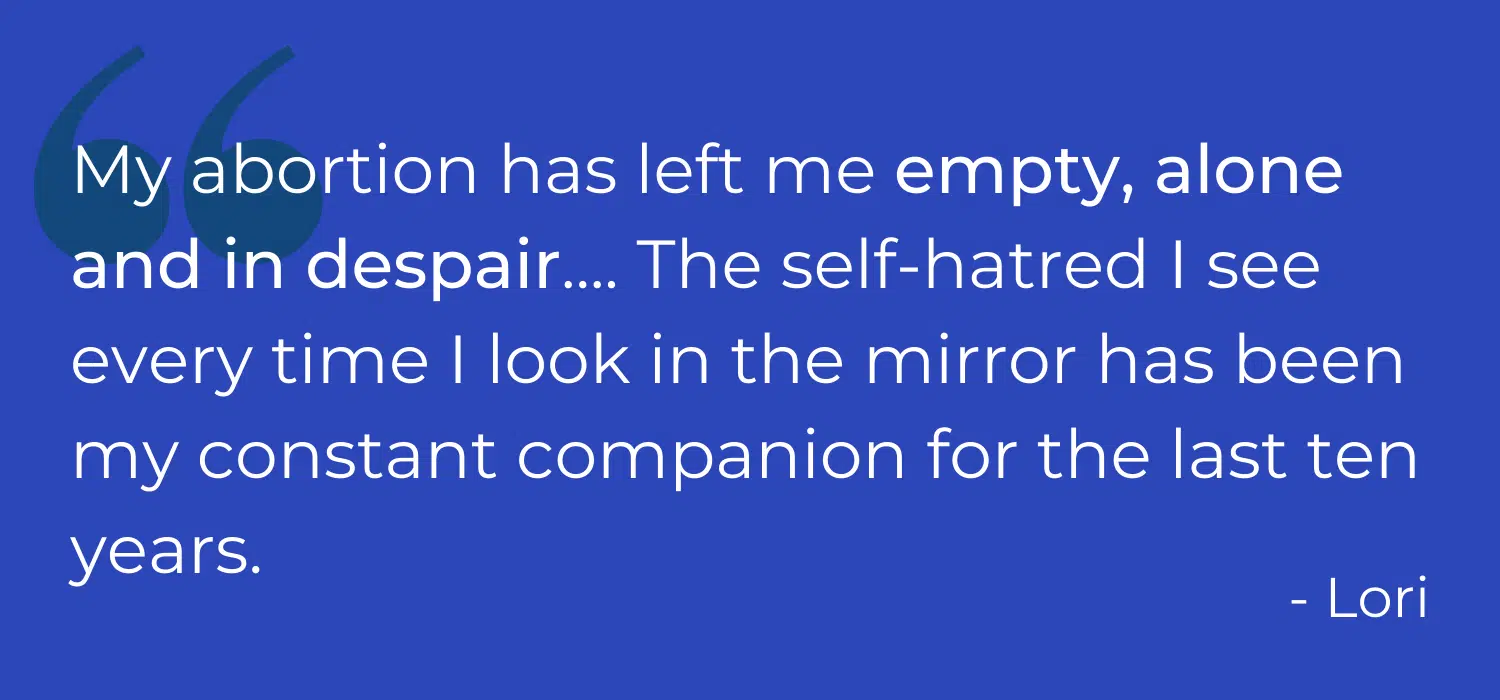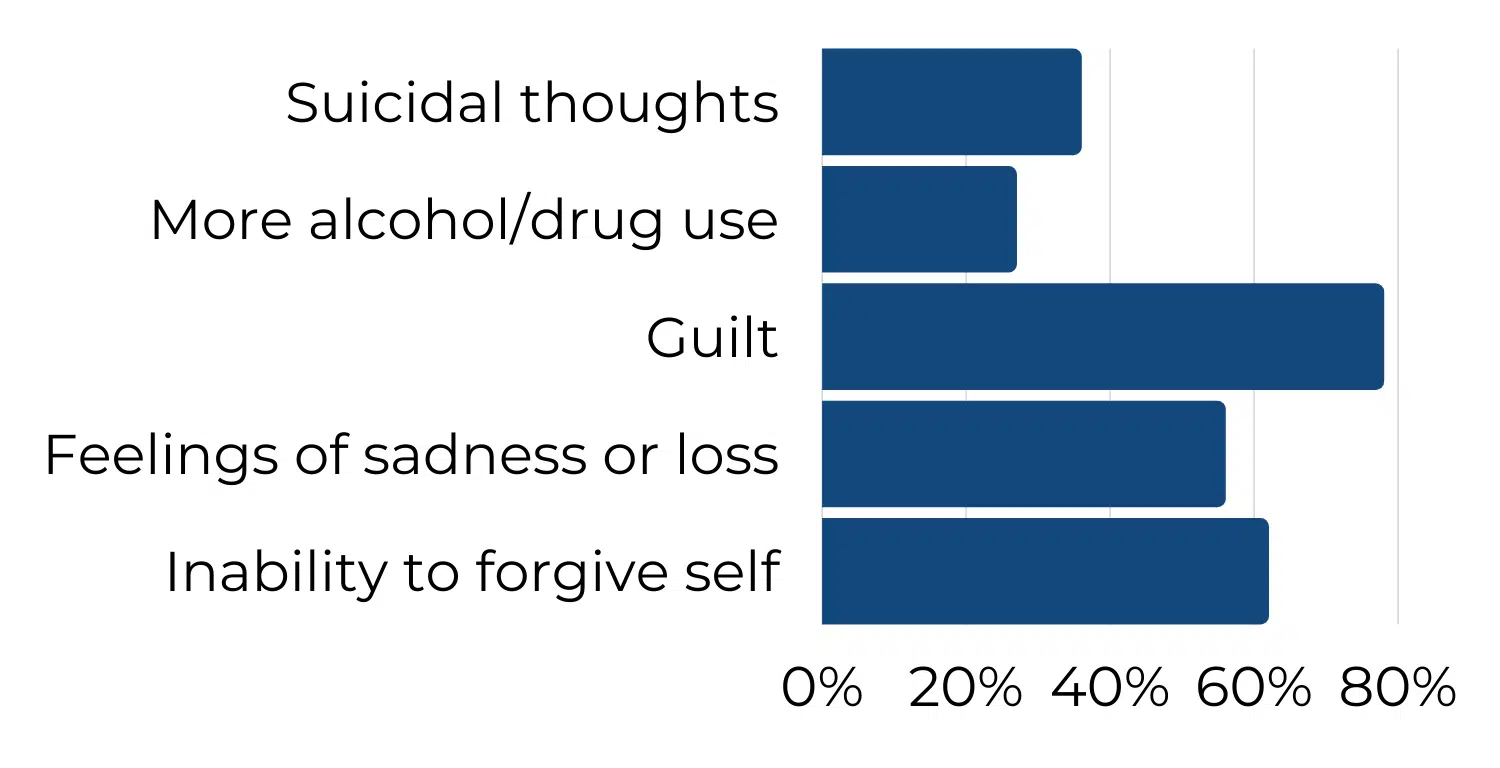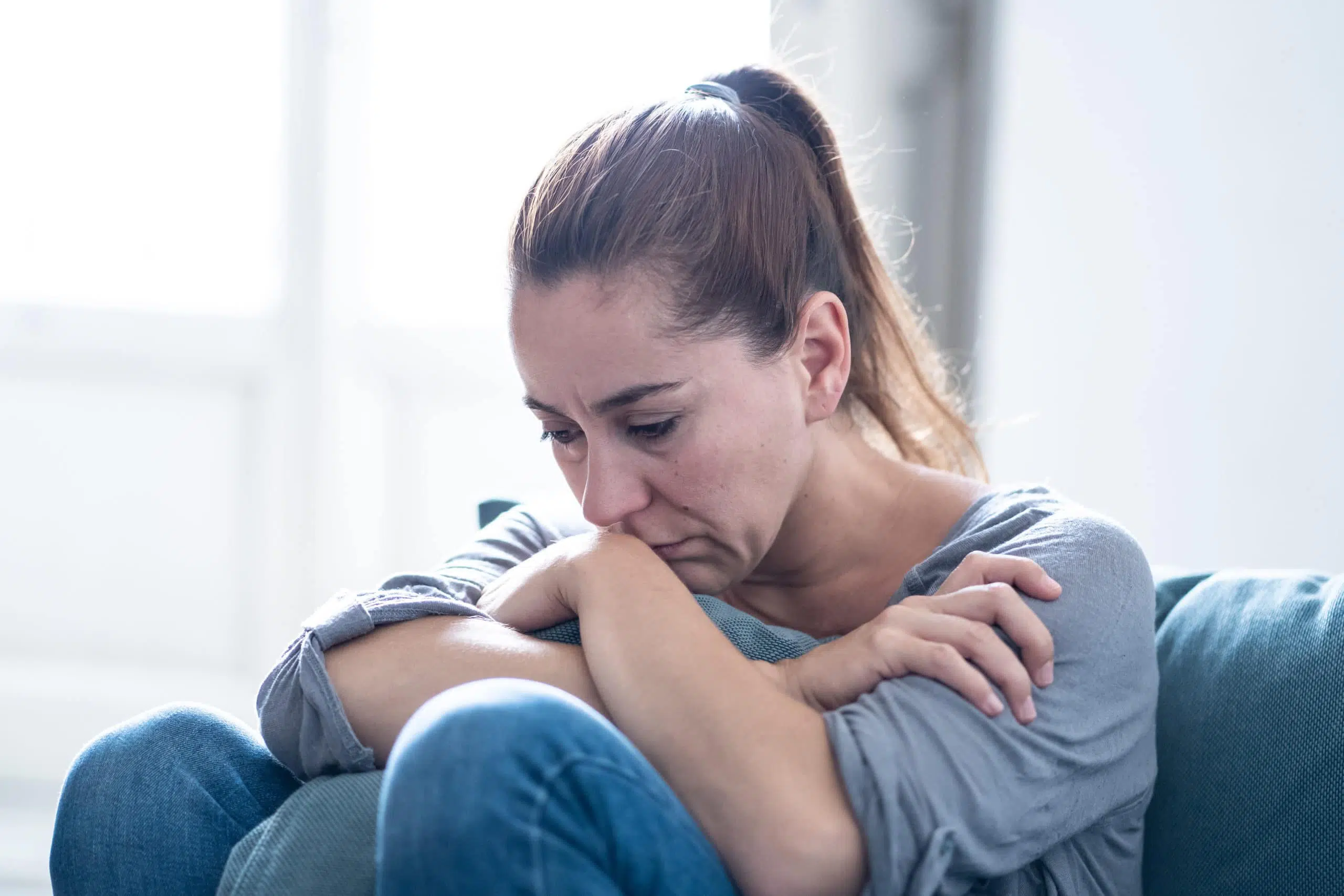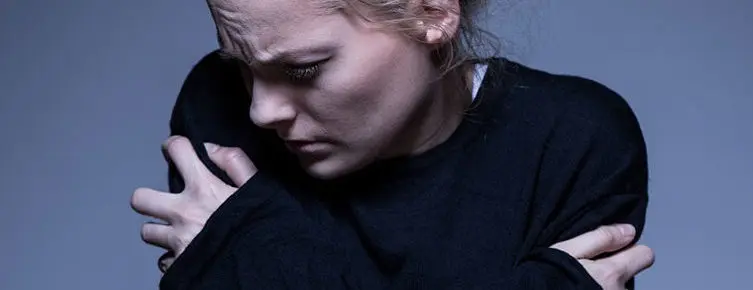Of all the victims of abortion, it is perhaps the mother and father who are the most neglected of all.
For pro-life advocates, the death of an innocent child tends to be the focus. For pro-choice advocates, acknowledging the parents as victims would weaken their own position.
Nevertheless, the reality is that those who obtain abortions are also victims. The trauma they experience both during and after abortion is rarely given the attention it deserves. But that trauma is real, and those who suffer from it need help.

Post-abortion stress syndrome testimonial from Rachel’s Vineyard: https://www.rachelsvineyard.org/emotions/affects.aspx
Post Abortion Stress Syndrome
Post-Traumatic Stress Disorder, or PTSD, is a condition of having severe negative reactions associated with an event. These reactions last long after the event has ended and interfere with one’s life. Common symptoms of PTSD include intrusive thoughts, such as nightmares and flashbacks, avoidance of reminders of the event, hyperreactivity, and other cognitive issues.
PTSD can be caused by a host of different things. These include childhood trauma, war, rape, accidents, or even just witnessing disturbing events. What causes PTSD in one person will not necessarily cause it in another. People react to things in very different ways.
Post Abortion Stress Syndrome, or PASS, is a name that describes certain PTSD-like reactions to abortion. These include avoidance of things that trigger memories about abortion, or nightmares about babies or the procedure. It can also include self-punishing behaviors, such as self-harm, severe depression, and mental distress.
While people can develop PTSD symptoms for many different reasons, certain criteria must be met for a strict diagnosis. First, the person must have had exposure to either real or threatened death, injury, or forms of sexual violence. This can either be a personal experience, or something that the person witnessed. In addition, the person must have at least a few specific symptoms. These may include intrusion (such as nightmares), avoiding reminders of the traumatic event, hyperactivity, and overreactions.
Is PASS Real?
When discussing post-traumatic stress symptoms, many tend to doubt that abortion causes PTSD. Indeed, pro-choice advocates often accuse others of making up PASS to further political goals. PASS itself is not recognized as an official diagnosis by American Psychiatric Association or the American Psychological Association. Thus, PASS is more of a colloquial term than scientific. However, it is indisputable that many women experience symptoms of PTSD associated with abortions. Indeed, if a physician diagnoses a patient with PTSD and identifies abortion as the source, this fits with the description of PASS.
Many pro-abortion sources claim that it is not having an abortion, but rather being denied an abortion, that causes women stress, anxiety, and other mental health issues. But when men and women do suffer trauma after an abortion, they can feel invisible, forgotten about, or rejected. The media wants us to believe that abortion is safe and will not cause any long-term psychological effects. For those that do suffer, this messaging can be damaging.
When women undergo abortions, all criteria for a triggering event are met. First, whether one views the unborn child as a person or not, its destruction is an experience of death. Second, many abortions are invasive procedures, which can evoke feelings of sexual violation. Lastly, women can experience bodily injury in the form of pain, bleeding, and organ damage.
Additionally, many men experience symptoms of post-abortion syndrome after abortions, as well. Even though the procedure doesn’t happen to them, abortions often affect them deeply and leave them hurting terribly. PTSD can arise from witnessing something happen to someone close to you, and these men’s trauma is real.
While every abortion may qualify as an exposure to trauma, not everyone who is exposed to it develops PTSD, or PASS. Some may develop symptoms associated with the traumatic event, while others are less affected by it. Nevertheless, as we shall see, research shows that a significant number of people do develop symptoms.
Related: Health Risks of Abortion
Post-Abortion Syndrome in Women
One study showed that 19% of respondents reported symptoms of PTSD due to the pregnancy that resulted in an abortion.
Another study on American and Russian women showed that 14.3% of Americans who obtained abortions met all criteria for PTSD. Many more had multiple symptoms but did not meet all requirements for diagnosis. For instance, 65% of Americans and 48% of Russians had nightmares or flashbacks about their abortion, but some didn’t meet all PTSD criteria.

Effects of abortion on American women. Source: https://www.researchgate.net/publication/8265918_Induced_abortion_and_traumatic_stress_A_preliminary_comparison_of_American_and_Russian_women
Many other women in the study reported various other symptoms. These included examples of avoidance, intrusion, hyperactivity, and cognitive difficulties associated with the procedure. Nearly a quarter of the American sample had trouble being near babies, difficulty sleeping, and difficulty controlling anger. American women generally had more negative effects and more symptoms of PTSD related to their abortions. Russian women, however, had higher rates of cognitive disruption.
Researchers also explored the reasons for the differences in PTSD symptoms between Americans and Russians. One factor is that American women were more likely to report prior traumatic events, even if these didn’t cause PTSD. And so, abortion may exacerbate prior traumas. Alternatively, the researchers suggest that cultural differences make it difficult to diagnose PTSD in non-western nations.
Belarusian Study
In another study of women who had abortion in Belarus, a much larger percentage of women experienced symptoms of PTSD. Though many women stated that they experienced relief after abortions, 32% had nightmares, and 76% had flashback episodes. 96% reported avoiding thinking about the abortion, and 92% experienced distress at exposure to reminders of the abortion. 48% had trouble sleeping. 48% had anxiety and panic attacks. 78% experienced depression connected with the procedure.
Though there is very little anti-abortion rhetoric in Belarus, guilt remained a constant among these women. As many as 80% expressed feelings of guilt over what they had done. Many more struggled with feelings that they would not be forgiven by God. This was very surprising to researchers since most of the women were not religious. Even those with little to no religious association of any kind often related that they felt they deserved divine punishment. Many felt a strong need for forgiveness, seeking it in cemeteries or churches, or by trying to form connections with their unborn child.
Ultimately, at least 50% of women in the sample met the criteria for the clinical diagnosis of PTSD. 32% more had symptoms of PTSD but did not meet all requirements for diagnosis. More than 60% of women said they would have liked more counseling to help them cope with their abortion.
By comparison, the National Vietnam Veterans Readjustment Study found that 26% of veterans in combat zones had symptoms of PTSD. 15% had full clinical PTSD, and 11% had what the study describes as “partial PTSD.” In other words, obtaining an abortion is at least as likely to induce symptoms of PTSD as military service in a combat zone.
Related: 4 Abortion Pill Stories That It’s NOT Risk-Free
PASS in Men
While research on the after-effects of abortion tends to focus on women, women are not the only ones affected by the procedure. There is evidence to suggest that men also suffer significant distress after abortions. Unfortunately, very little research has been conducted on men’s mental reactions to abortions.
In the few studies that have been performed on the subject, symptoms of PTSD appear to be common among post-abortion men. Many suffer anxiety, feelings of helplessness, and flashbacks. Many try to avoid any reminders of abortion at all.
Particularly since men often do not feel a right to grieve, they tend to isolate themselves and suppress their emotions. This can make the abortion experience even more difficult for them, leading to dissociation and various avoidance symptoms of PTSD. They often also tend to have more complicated or delayed grief and trauma reactions than women do.
Due to the lack of research, it’s difficult to determine what percentage of men overall experience PTSD. From the limited research available, however, it appears that 40% of men may suffer from PTSD because of abortion.
Effects of PASS on Women’s Lives
PTSD can interfere with anyone’s life. Symptoms such as stress, emotional pain, trouble sleeping, and avoidance can make it difficult to function. Of particular concern, however, is the fact that post-abortion syndrome may contribute significantly to other risks, such as suicide. PASS can even make it hard for mothers to form bonds with future children.
Suicides
Time and time again, research has shown that abortion significantly increases risk of suicide. In some studies, suicide rates were shown to be somewhere between three and six times higher than they are among women who give birth.
To some extent, the relationship between abortion and suicide may be the result of preexisting factors. Women who get abortions may well be more likely to commit suicide to start with. Studies show, however, that the increased suicide risk exists even after accounting for other variables that could affect a woman’s quality of life.
Increased suicide rates among women who obtain abortions also appear to have little to do with any preexisting psychological issues. Record linkage studies show that increases in suicidal behaviors among those who obtain abortions are not linked to prior mental health issues. Instead, the increased mental health issues are more likely to be a result of the procedure itself.
Child Maltreatment
Self-harm isn’t the only concern to consider regarding post-abortive women. Not only can abortion harm the mental health of mothers, but it can put their children in danger as well.
Even after other variables are taken into account, women who obtain abortions are more likely to neglect their children. They struggle to emotionally support them, and their children experience more negative outcomes. Abortion has even been directly associated with increased child maltreatment in the form of slapping, hitting, kicking, biting, beating, and other physical aggression against the woman’s children.
Different ideas have been offered to explain why abortion leads to higher levels of child abuse. Some suggest that the legality of abortion weakens social taboos against violence towards children, devaluing the lives of children. Others suggest that abortion lessens children’s confidence in their parent’s care and breeds hostility. These factors may contribute to the problem, but research indicates that the psychological impact of abortion on the mother is likely more significant.
Often, abortion increases anxiety and depression associate with future pregnancies and births. Studies have shown that these mental effects interfere with a parent’s relationship with her children. Mothers struggle to bond with their infants, find their needs enraging, and feel anxious or helpless in caring for them.
This finding shouldn’t be a surprise. Some of the most common symptoms of PTSD and PASS include avoidance, emotional numbness, and withdrawal from others. Indeed, 25% of American women who had abortions later had difficulty just being around babies. The sound of a child crying can trigger feelings of guilt or even flashbacks, further interfering with the ability to bond.
These women often are not bad people. They’ve been through a traumatic experience, and that can interfere with healthy relationships. Often, they simply have no idea how to deal with what they’re going through, or how to cope.
Related: Relationship after Abortion: Will Abortion Help or Hurt?
Men and Women Need Help
One of the most common findings in all studies regarding abortion trauma is that current counseling and psychological help is wholly inadequate.
In one study, 85% of both men and women said they felt they received inadequate counseling before the abortion. Another found that more than 60% of women would have liked more counseling after their abortions. Around 25% of those included in the study accepted offers of treatment. The study also details how most women who suffer from PASS tend to hide their experiences and rarely seek help.
They are neglected, and with a few avenues to explore for emotional support, they are left to deal with the trauma themselves. Many blame abortion providers for not fully informing them. Some believe the abortion provider misled them about the procedure on purpose.
These feelings don’t just go away with time, either. Research on the emotional state of women at menopause found that they still struggled with abortion they had years ago. Even when these women believed that their abortion was the right decision, they described the emotional impact of the abortion as very negative. Many still struggled with symptoms of PASS, including trying to forget the whole experience. As a result, the researchers recommend that post-abortion counseling be made available throughout life.
Many policies regarding abortion, such as waiting periods and mandatory counseling before abortions, help reduce suicide rates. These sorts of policies are a step in the right direction, but adequate post-abortive care is irreplaceable.
If we are to bring about an end to abortion, we must recognize the true harm that it does. For abortion does not just destroy the lives of the unborn, but also harms mothers, fathers, and everyone close to them.
What About Those Who Are Happy with Their Abortion?
Some claim that abortion brings relief to many women, and thus must be permitted. Others believe that abortion should be permitted in cases of rape, incest, birth defects, or to maintain the mental health of the mother. They may claim that not having access to abortion can cause depression and anxiety, while also denying the reality of PASS. This is simply denying the pain that men and women can feel after an abortion. Check out the following resource to learn more:
Related: Facts You Should Know: Is Abortion Ever Okay?
Final Thoughts
Not everyone who has had an abortion will experience PASS. They may not experience a decline in mental health, flashbacks to the abortion, and they may not mistreat other children. But some do experience PTSD-like symptoms.
Many pro-abortion sources will claim that there is little, or no, evidence that abortion causes post-traumatic stress symptoms. But we’ve seen studies that show otherwise. And for the men and women who do suffer these symptoms, being told that what they experienced shouldn’t give them trauma is harmful and invalidating.
If you are experiencing symptoms of PASS, know that it can be overcome. You can heal, and you can move forward. While many try to deny the traumatic effects abortion can have on someone, know you are not alone and there is help available for you. Below are some resources to help men and women heal from the trauma of abortion.













I plan to use this in a podcast on Western Rite Radio
Excellent, Father. Please reach out to us at hli@hli.org if you need additional resources.
Wonderful evidence and research. Thank you!
My daughter doesn’t talk to me because I wouldn’t support her getting an abortion at 15, which my husband supported. That was 15 yrs. ago, and she still doesn’t include me in her family’s life. She does include my husband. I believe I am a negative reminder of her abortion. My husband and I are divorced after 40 years of marriage. The abortion was the start of the decline of our marriage.